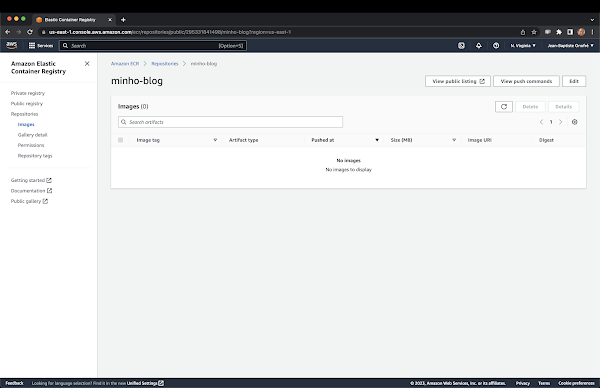What's new in Apache Karaf Decanter 2.7.0 ?
Apache Karaf Decanter 2.7.0 release is currently on vote.
I'm a little bit anticipating to the release to do some highlights about what's coming ;)
Karaf Decanter 2.7.0 is an important milestone as it brings new features, especially around big data and cloud.
HDFS and S3 appenders
Decanter 2.7.0 brings two new appenders: HDFS and S3 appenders. The HDFS appender is able to store the collected data on HDFS (using CSV format by default). Similary, S3 appender store the collected data as an object into a S3 bucket. Let's illustrate this with a simple use case using S3 appender. First, let's create a S3 bucket on AWS: So, now we have ourdecanter-test S3 bucket ready.
Let's start a Karaf instance with Decanter S3 appender enabled:
Then, we configure S3 appender in etc/org.apache.karaf.decanter.appender.s3.cfg:
###############################
# Decanter Appender S3 Configuration
###############################
# AWS credentials
accessKeyId=...
secretKeyId=...
# AWS Region (optional)
region=eu-west-3
# S3 bucket name
bucket=decanter-test
# Marshaller to use
marshaller.target=(dataFormat=json)
We also install the OSHI collector to get machine details:
karaf@root()> feature:install decanter-collector-oshi
Then, we can see the objets created in the S3 bucket:
Grafana Loki appender
Decanter 2.7.0 also brings another new appender: the Grafana Loki appender. Loki is a horizontally-scalable, highly-available, multi-tenant log aggregation system inspired by Prometheus. It's possible to use Loki in Grafana by adding the corresponding datasource in Grafana. You can download Loki from https://github.com/grafana/loki/releases. First, we create the loki configuration as yaml file:
auth_enabled: false
server:
http_listen_port: 3100
ingester:
lifecycler:
address: 127.0.0.1
ring:
kvstore:
store: inmemory
replication_factor: 1
final_sleep: 0s
chunk_idle_period: 1h # Any chunk not receiving new logs in this time will be flushed
max_chunk_age: 1h # All chunks will be flushed when they hit this age, default is 1h
chunk_target_size: 1048576 # Loki will attempt to build chunks up to 1.5MB, flushing first if chunk_idle_period or max_chunk_age is reached first
chunk_retain_period: 30s # Must be greater than index read cache TTL if using an index cache (Default index read cache TTL is 5m)
max_transfer_retries: 0 # Chunk transfers disabled
schema_config:
configs:
- from: 2020-10-24
store: boltdb-shipper
object_store: filesystem
schema: v11
index:
prefix: index_
period: 24h
storage_config:
boltdb_shipper:
active_index_directory: /tmp/loki/boltdb-shipper-active
cache_location: /tmp/loki/boltdb-shipper-cache
cache_ttl: 24h # Can be increased for faster performance over longer query periods, uses more disk space
shared_store: filesystem
filesystem:
directory: /tmp/loki/chunks
compactor:
working_directory: /tmp/loki/boltdb-shipper-compactor
shared_store: filesystem
limits_config:
reject_old_samples: true
reject_old_samples_max_age: 168h
chunk_store_config:
max_look_back_period: 0s
table_manager:
retention_deletes_enabled: false
retention_period: 0s
ruler:
storage:
type: local
local:
directory: /tmp/loki/rules
rule_path: /tmp/loki/rules-temp
alertmanager_url: http://localhost:9093
ring:
kvstore:
store: inmemory
enable_api: true
Then, we start loki using this configuration file:
./loki-darwin-amd64 --config.file=loki-config.yaml
Loki is now available on http://localhost:3100.
The Decanter Loki appender converts all data collected as log message and store into Loki (sent via the Loki REST API).
We just have to install the Decanter Loki appender and configure the Loki location in etc/org.apache.karaf.decanter.appender.loki.cfg:
karaf@root()> feature:install decanter-appender-loki
######################################
# Decanter Loki Appender Configuration
######################################
# Loki push API location
loki.url=http://localhost:3100/loki/api/v1/push
# Loki tenant
loki.tenant=decanter
# Loki basic authentication
#loki.username=
#loki.password=
# Marshaller
#marshaller.target=(dataFormat=raw)
Apache Druid collector
Decanter 2.7.0 also brings new collectors. A new collector is the Apache Druid collector. I already talked about Druid in a previous blog post: https://nanthrax.blogspot.com/2021/01/complete-metrics-collections-and.html. The Decanter Druid collector periodically (scheduled) executes queries on the Druid API. We can install the Druid collector:
karaf@root()> feature:install decanter-collector-druid
Then, you can configure the location of the Druid API and the queries you want to execute in etc/org.apache.karaf.decanter.collector.druid.cfg:
#
# Druid broker query API location
#
druid.broker.location=http://localhost:8888/druid/v2/sql/
# Druid queries set, using syntax: query.id
query.foo=select sum_operatingSystem_threadCount from decanter
The queries are prefixed with query.. For instance, you can configure multiple queries using:
query.foo=select count(*) from decanter
query.bar=select bar from decanter
OpenStack collector
Another new collector is the OpenStack collector. The Decanter OpenStack collector periodically (scheduled) requests OpenStack APIs to get metrics about OpenStack services. We can install the OpenStack collector:
karaf@root()> feature:install decanter-collector-openstack
This feature also add etc/org.apache.karaf.decanter.collector.openstack.cfg configuration file where you can define which services you want to request and the location of these services:
#
# Decanter Openstack collector
#
# Openstack services API locations
#
openstack.identity=http://localhost/identity
openstack.project=xxxxxxx
openstack.username=admin
openstack.password=secret
openstack.domain=default
openstack.compute.enabled=true
openstack.compute=http://localhost/compute/v2.1
openstack.block.storage.enabled=true
openstack.block.storage=http://localhost/volume/v3
openstack.image.enabled=true
openstack.image=http://localhost/image
openstack.metric.enabled=true
openstack.metric=http://localhost/metric
# Unmarshaller to use
unmarshaller.target=(dataFormat=json)
This OpenStack Collector could be improved depending of the user comments ;)
Refactoring of Apache Camel collectors and Camel 3.x upgrade
Karaf Decanter now fully supports Camel 3.x (and still work with Camel 2.x). Decanter Camel collector actually supports two collectors:- Camel interceptor strategy (aka tracer)
- Camel event notifier
DecanterInterceptorStrategy:
DecanterInterceptStrategy decanterCamelTracer = new DecanterInterceptStrategy();
decanterCamelTracer.setDispatcher(eventAdmin);
camelContext.addInterceptStrategy(decanterCamelTracer);







Comments
Post a Comment